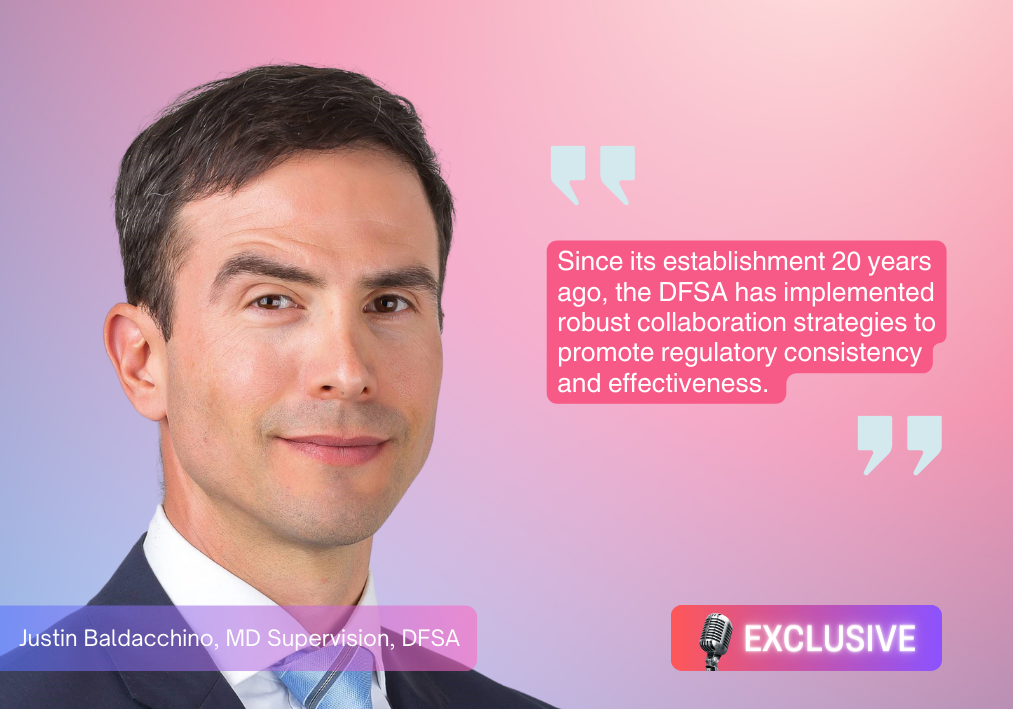April 27, 2024 | Dubai, UAE
Justin Baldacchino is the Managing Director, Supervision, at the Dubai Financial Services Authority (DFSA). He has 25 years of experience in international finance, and brings a wealth expertise in regulatory interpretation, liaison, and implementation. He has extensive experience in risk, regulatory affairs, compliance, AML, capital, liquidity, innovation, and technology.
Prior to joining the DFSA in January 2020, Mr Baldacchino served as the Group Head of Regulatory Compliance for ANZ Bank in Australia. Prior to that, he worked at JP Morgan in Hong Kong, holding various roles, including Head of Regulatory Compliance, APAC and Head of International Operational Risk, APAC. Before JP Morgan he was the Head of Compliance and Risk Governance, Asia for National Australia Bank in Hong Kong, and held several executive roles in Australia.
Mr Baldacchino is a distinguished alumnus of Melbourne Business School, holding an MBA and Post Graduate Diploma, along with a Bachelor of Economics from La Trobe University. He further augmented his expertise by completing the Harvard Executive Program in Regulatory Strategic Management in Boston. He is certified as an AML Specialist and also served as an Executive Board Member for the Association of Certified Anti-Money Laundering Specialists. Presently, he is a member of The Basel Consultative Group (BCG).
WT: Which strategies do you think must be implemented to ensure regulatory compliance in a rapidly evolving financial services landscape, particularly within the regional context?
JB: Various regional jurisdictions, including the UAE, have dedicated significant efforts to continually enhance their regulatory frameworks, ensuring alignment with international best practices and standards, while also fostering innovative solutions to address the evolving landscape of financial technologies. To navigate this dynamic regulatory environment effectively, financial institutions must remain up to date with the regulatory developments across the jurisdictions in which they operate as well as the locations their existing and potential clients are based. Financial institutions are advised to conduct thorough assessments of potential and new regulatory changes, determine their relevance, and if necessary, measure the potential impact on their activities and resources.
WT: How do you stay abreast of emerging technologies and their potential impact on regulatory frameworks and banking practices?
JB: The constant evolution of technology presents a daily regulatory challenge which we actively confront through ongoing engagement with the industry. We participate in conferences, host roundtable discussions, and actively seek feedback from the regulated community. As founding members of the Global Financial Innovation Network Coordination Group, and the Vice Chair of the Africa and Middle East Committee of the International Organisation of Securities Commissions (IOSCO), we engage with fellow regulators and standard setters regularly. We also host sector-specific regulator information sharing groups.
WT: How do you prioritize competing demands between regulatory requirements, risk management, and technological innovation in your decision-making process?
JB: We see regulatory requirements, risk management and technological innovation as interconnected rather than competing demands. Regulatory requirements are a risk management tool, setting up minimum standards designed to reduce risk. Our understanding of risk drives the development of regulatory requirements. Additionally, we use innovative technology to streamline risk monitoring processes.
WT: How do you approach fostering a culture of compliance and ethical behaviour within a financial institution, especially in a dynamic environment like regional financial services sector?
JB: Fostering a strong compliance culture is key to maintaining the DIFC’s position as a leading global financial hub, and it requires proactive measures. As a regulator, we have cultivated a culture where integrity and responsibility are fundamental values – driving sustainable success and trust within the DIFC. Applying a risk-based supervisory approach which is aligned to the nature, scale, and complexity of each firm’s business model allows us to mitigate risks to our regulatory objectives while supporting growth and innovation. We set clear expectations and standards of conduct for both Authorised Firms and Individuals and promote open communication, so they feel encouraged to raise concerns and seek guidance.
WT: In your opinion, what are the key technological advancements shaping the future of financial regulation, and how should regulators adapt to these changes?
JB: We think the rise of Artificial Intelligence (AI) will significantly impact the industry and subsequently, the way in which regulators supervise businesses. The core objectives of a regulator remain consistent despite emerging technology. These objectives include safeguarding users of financial services, preserving market integrity and maintaining financial stability. When new financial services technology emerges, regulators must look beyond the technology itself and examine the underlying financial product or service being offered. Regulators then consider whether the existing regulations and supervisory methods are fit for purpose and adapt accordingly.
WT: The UAE is committed to combating money laundering and terrorist financing (AML/CFT). How would you utilize your experience to strengthen the DFSA’s AML/CFT framework?
JB: With a dedicated financial crime supervision team leading the charge, we provide support to SMEs across the DFSA. Year after year, we continuously enhance our application of the risk-based approach in line with the risk and context of the Dubai International Financial Centre (DIFC) and the UAE. This entails conducting on-site inspections and engaging with regulated firms to monitor compliance and effective implementation of their AML/CFT obligations. The DFSA is committed to supporting the UAE’s efforts in fighting financial crime, it is a key regulatory priority.
WT: Can you outline your experience in developing and implementing innovative solutions to enhance regulatory processes or improve banking operations?
JB: As the regulator of a dynamic financial hub, we understand the importance of developing innovative solutions. The key principle in developing such solutions is user experience, efficiency, flexibility, and security. Considering these principles, we have developed dynamic tools to gather regulatory data from supervised entities. These tools are tailored to various business models as well as individual firms. From the data analysis perspective, we recently upgraded our Business Intelligence platform to stay abreast with the industry developments. We have also made our internal data workspace more accessible and efficient by automating and consolidating existing ever-expanding data sources into one single channel.
WT: What strategies would you employ to collaborate with industry stakeholders, other regulatory bodies, and international organizations to promote regulatory consistency and effectiveness?
JB: Since its establishment 20 years ago, the DFSA has implemented robust collaboration strategies to promote regulatory consistency and effectiveness. We engage local, regional, and international industry stakeholders such as Central Bank of the UAE, the UAE Securities and Commodities Authority and the Virtual Assets Regulatory Authority through regular dialogue and collaboration. Collaboration with other regulatory bodies involves, but are not limited to, information sharing, responses to surveys and consultation papers, committees, working groups, and joint initiative. By fostering transparency, trust, and open communication, we create a conducive environment for collaboration, ultimately enhancing regulatory coherence and success on a global scale.
WT: The financial sector is constantly evolving with new technologies like Fintech and Blockchain. How would you stay ahead of the curve in terms of understanding these emerging trends and their potential regulatory implications?
JB: As a regulator, we prioritise understanding emerging technologies to ensure a dynamic regulatory framework. To stay ahead of the curve, we leverage the top talent within our organisation and engage with the industry constantly. Our approach involves ongoing conversation with industry stakeholders, monitoring market developments and conducting research. By fostering a culture of innovation and knowledge sharing, we position ourselves to capitalise on emerging trends, while navigating potential regulatory implications. This balanced approach permits us to protect consumers and maintain financial stability in the ever-evolving financial landscape.
___________________________________________________________________________________________
About DFSA: The DFSA is the independent regulator of financial services conducting in or from the DIFC, a purpose-built financial free-zone in Dubai, UAE. The DFSA’s regulatory mandate includes asset management, banking and credit services, securities, collective investment funds, custody and trust services, commodities futures trading, Islamic finance, insurance, an international equities exchange, and an international commodities derivatives exchange.
————
Disclaimer: The content of the above information is exclusive to The Wealth Today and should not be reproduced without acknowledging the source. The above content presents the view of the interviewee and The Wealth Today can










